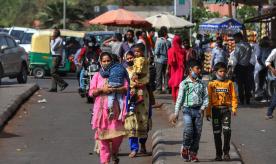Networks, livelihoods and well-being in a pandemic: A panel study using matched husband-wife-friends data in urban India
Nearly 80% of all workers in India are daily wage earners or self-employed in the informal sector (ILO, 2018), a challenge in the path to inclusive development in the country. These workers constitute a large and particularly vulnerable section of India's population, especially in urban areas, that has no access to public safety nets and is highly susceptible to loss of work/income due to economic and health shocks. An all-pervasive crisis like the ongoing COVID-19 pandemic is likely to hit this section of the population very hard, especially due to and following a nationwide lockdown that risks their lives and livelihoods. Yet, we have very little understanding so far on what the immediate and long-term impact of the pandemic on this particularly vulnerable demographic group could be.
This project aims to fill this gap by studying:
- The economic fallout of the crisis on families and individuals who are either self-employed or daily wage-earners in the urban informal sector in India.
- The coping mechanisms that these vulnerable groups adopt in responding to and in recovering from the crisis, specifically the role of their social networks.
- The effectiveness of policy response by the government in mitigating impacts of the crisis on households' food security and income shock, especially comparing minimum income support with in-kind transfers (free grains).
- The effects of the pandemic on mental and physical health, during and in the aftermath of the health and economic crisis. Moreover, our study design will allow us to compare and contrast the effect of the pandemic on both men and women's employment, mental and physical well-being.
This study is important and timely, and is expected to have the following impacts:
- Enable us to estimate the immediate and medium-term impact of the COVID-19 crisis on the livelihoods, incomes, food security, mental and physical health of urban informal sector workers in India, including differences by gender.
- Assess the efficacy of the government's announced relief measures in ameliorating the impact of the crisis for these vulnerable groups, including relative benefits of income support and in-kind transfers, and speedily inform policy.
- Contribute to our academic understanding of the processes of response, recovery and building resilience against such devastating and widespread shock among vulnerable groups more broadly.
The study is an extension of an ongoing randomised control trial, in which we are studying the impact of an app-based hyperlocal employer-employee matching service that was offered to both husbands and wives (in one treatment arm) and also the wives' friends (in another treatment arm), relative to couples who were not offered this service (control group), with subsequent implications on women and their spouses’ employment outcomes, income, autonomy, gender attitudes etc.






